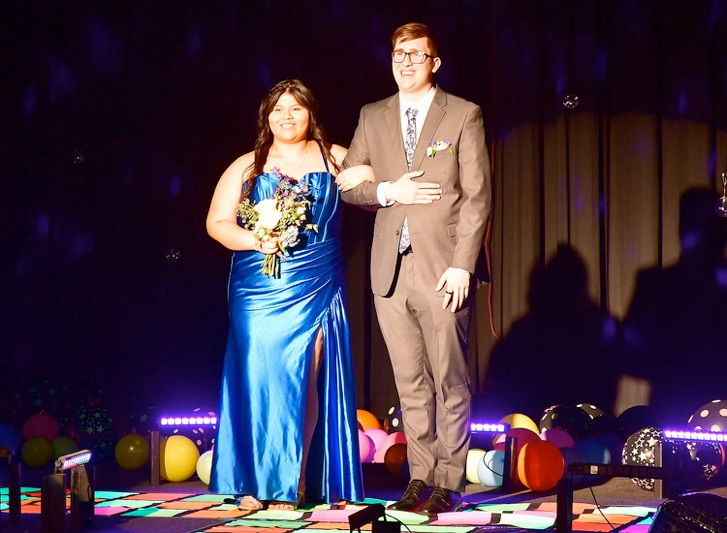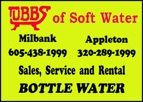Call us at: 320-839-6163




“MEET ME AT THE DISCO” was the them for the Ortonville High School Prom 2025 held Saturday, May 3 at the Ortonville School. Pictured above is Kayla Zarate, left, being escorted by Archer Dorry. Archer was one of the Prom Committee members.
Big Stone City possible site for new State Penitentiary
Project Prison Reset voted in total agreement Tuesday, April 29 that the current South Dakota State Penitentiary, located in Sioux Falls, which predates the state itself, should be replaced. The group, which came together after the South Dakota state legislature failed to appropriate money to build a new men’s prison, is now examining how big a new facility should be and where it should go.
Different submissions have come in to the governor’s office from communities in eastern South Dakota. Beyond the Sioux Falls area, there’s one section of land in Huron, two outside the city limits of Aberdeen that are about nine miles apart from each other, one outside Mitchell and another in and next to Big Stone City.
The submission in Big Stone City is the location of the current Saputo Foods location, which is currently nonoperational.
The Grant County Development Corporation presented land and a premier site for consideration by the South Dakota Department of Corrections for its proposed new men’s prison facility.
Located at 14449 South Dakota Highway 109 in Big Stone City, this property exceeds the RFI requirements and is immediately available for development. Supporting materials include:
• 145 acres of commercially zoned land, providing significant room for initial development and future expansion.
• An existing 171,870 SF building, formerly used for food processing, offering reuse potential or full redevelopment flexibility. Heavy utility infrastructure already in place, ideal for institutional needs.
• Electrical: Direct access to 115 kV and 230 kV transmission lines, with nearby substation capacity and 5 MW currently available.
• Water & Sewer: Initial discussions with Grant Roberts Water indicate that while there is existing infrastructure near the site, the current system does not have the capacity to meet the full 230,000 gallons per day water requirement outlined in the RFI. To move forward, further coordination with the City of Big Stone, engineering consultants, and service providers will be necessary to evaluate system upgrades and development options.
• Natural Gas: Available on-site.
• Fiber Optic: High-speed internet access via fiber optic infrastructure.
• Transportation Access: Situated directly on SD Highway 109 and near U.S. Highway 12, with close proximity to regional rail lines.
The Grant County Development Corporation (GCDC) is fully supportive of this project and is actively engaged in facilitating its success. The organization, alongside key regional leaders and stakeholders, recognizes the significant economic and workforce benefits this facility would bring to Grant County and the surrounding area. In addition to GCDC’s commitment, the Grant County Board of Commissioners has formally expressed their support. This alignment between local leadership and development efforts ensures a united front in welcoming and supporting the project—from initial planning and infrastructure coordination to long-term community integration.
In the Sioux Falls area, there are nine possibilities; some are within the city limits, and others are close to Sioux Falls or not far from Canton or Worthing. Two are within the city limits of Sioux Falls: one to the immediate southwest of the intersection of Interstates 29 and 90 and another in the northern part of the city. Three are nearly within Sioux Falls city limits: one at the intersection of 259th Street and Marion Road, another south of Interstate 90 to the west of the city and a third similarly just outside city limits.
Two are in the Worthing, S.D. area: one on Highway 18 and another slightly farther south. Another location is in the immediately vicinity of Canton, S.D.
The location between Harrisburg, S.D. and Canton, where the state had previously focused on putting a facility, remains a possibility as well. There has been vocal and organized opposition to placing a prison in this location, and now, the perspectives of other communities are weighing on the minds of the task force as they consider submissions.
Project Prison Reset’s task force will meet again in early June. And it’s a safe bet that between now and then, they’ll learn what people in the different communities with proposed locations have to say.
BSC Sheriff investigating multiple vehicle thefts in Ortonville
On Thursday, May 1, the Big Stone County Sheriff's Office received several reports of motor vehicle-related crimes within the City of Ortonville.
Two vehicles were reported stolen from separate residences. Additionally, multiple residents reported that their vehicles had been unlawfully entered, rummaged through, and had personal items stolen.
The stolen vehicles were described as follows:
• Tan, 2004 Chevrolet Silverado (Extended Cab Pickup) Minnesota License Plate: RZH507
• Red, 2009 Chevrolet Silverado (Crew Cab Pickup) South Dakota License Plate: 18009C. Notable features are a dump box insert in the pickup bed and business stickers on the vehicle’s windows.
Both vehicles have since been recovered in Milbank, SD
The Big Stone County Sheriff's Office urges residents to remove ignition keys from vehicles and ensure all vehicle doors are locked. They are also asking for the public to review any home surveillance video that may have captured any aspect of the thefts or any suspicious activity.
If you have any information regarding the whereabouts of the stolen vehicle or other relevant details, please contact the Big Stone County Sheriff’s Office at (320) 839-3558.
This coincides with the Roberts County Sheriff’s Office actively investigating a string of stolen vehicles and burglaries that have occurred April 29-30 in the areas of Ortonville, Milbank, Corona, Wilmot, and Summit. They are working alongside neighboring agencies to identify those responsible and bring them to justice.
The Roberts County Sheriff’s Office has already received valuable surveillance footage from several residents and are now asking for the public’s help. If you have:
• Home or business security cameras
• Dashcam footage
• Witnessed anything suspicious during the last two nights, please come forward.
Even the smallest piece of information could help solve these crimes.
If you have any information, please contact the Roberts County Sheriff’s Office at 605-698-7667 and ask to speak with Deputy Austin Searles.






